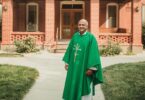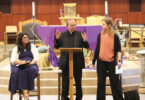
Rohingya Children gather at a camp for displaced people Sept. 6 in Maungdaw township, Rakhine state, Myanmar. More than 120,000 Rohingya, the vast majority of them Muslim, remain interned in camps in Rakhine, where they face restrictions on their movement and limited access to basic services and education. (CNS photo/Nyein Chan Naing, EPA)
by Catholic News Service
SITTWE, Myanmar (CNS) — Sixteen-year-old Rok Sham wants to be an engineer. In March 2018, she will take Myanmar’s national matriculation exams and expects to do well in physics, chemistry and economics.
To prepare for the exams, she has a daily study schedule covering the six test subjects.
“I study after dinner from 7 to 11 p.m. and get up at 4 in the morning to study again before going to school,” Rok Sham recently told ucanews.com.
She studies under a solar-powered light in a small room in the squalid camp for internally displaced people where she lives with seven other members of her family.
Rok Sham must to take a bus and a bike taxi to get to the government-run school in Thetkaepyin village. It is the only high school open to the Rohingya in Sittwe, the capital of Rakhine state, and is located a few hundred feet across unused railway tracks from Sittwe University.
An estimated 2,000 Rohingya students from the camps and villages are crammed into crowded classrooms at the high school.
Rok Sham said prior to the religious violence that broke out in 2012, she was attending a regular school with Rakhine students. Her family was forced to flee its home and take refuge at Kaung Doke Khar Camp, where more than 2,000 Rohingya now reside.
More than 120,000 Rohingya, the vast majority of them Muslim, remain interned in camps in Rakhine, where they face restrictions on their movement and limited access to basic services and education.
Aung San Suu Kyi, Myanmar’s state counselor, or prime minister, said in a speech to international diplomats Sept. 19 that all people living in Rakhine have “access to education and health care services” without discrimination. She added that the government has upgraded 300 schools in Rakhine and that the vocational and technical training programs have begun.
“Muslim students also have access to higher education without any discrimination,” said Suu Kyi, who has not been to a conflict-stricken Rakhine since taking office in April 2016.
But the reality on the ground is very different. Rok Sham realizes that she and other Rohingya who pass the exams cannot attend the nearby Sittwe University.
“I am trying hard to pass the matriculation exams and I haven’t given up hope to pursue my goal. I hope for the best in the future,” she said.
The government-run university is the only one in Rakhine, which was home to an estimated 1.1 million Rohingya. But Rohingya students are barred from setting foot on campus, with authorities justifying the restriction as a way of preventing violence.
Rok Sham said she was concerned over the violence in the state’s north where the actions of Myanmar’s military has resulted in 500,000 Rohingya fleeing to neighboring Bangladesh. While she said the ongoing violence may further affect her ability of getting a better education, she remained determined that it or any other challenge would not stop her from reaching her goals.
Rok Sham’s father, Mohammad Ami, said his family relied on handouts from international nongovernment organizations to survive, and struggled to pay school expenses for four children.
Two of them attend a primary school inside the camp, staffed by local volunteer teachers and run by relief agencies, UNICEF and the Lutheran World Federation. Rok Sham and her sister attend the high school in Thetkaepyin.
“We try our best to help our children continue their education as only education can bring them a bright future,” said Mohammad Ami, who is also a camp committee member.
His aim is to send Rok Sham to Yangon University to undertake her engineering studies.
The Advisory Commission on Rakhine State, led by former United Nations secretary-general Kofi Annan, said in its final report released Aug. 24 that it was concerned about the Muslim population’s lack of access to higher education. It called upon the government to “find ways and means to permit Rohingya students physical presence at university in Rakhine state.”
It added that many Muslims find it “extremely difficult” to attend university in Rakhine, or elsewhere, because of discriminatory practices and limitations on freedom of movement.
Salim Khan, a Rohingya Muslim who is a volunteer teacher at a learning center in Kaung Doke Khar Camp, said that while students might successfully complete lower-level education, there is need for ongoing support.
“Some students who pass the matriculation exams can’t attend the Sittwe University,” Salim Khan said. “So some join international nongovernmental organizations while others are jobless and remain in the camps.”






